
Protea laurifolia, also known as the grey-leaf sugarbush, is a shrub from South Africa. It is native to the Cape Provinces of South Africa.

Trianthema is a genus of flowering plants in the ice plant family, Aizoaceae. Members of the genus are annuals or perennials generally characterized by fleshy, opposite, unequal, smooth-margined leaves, a prostrate growth form, flowers with five perianth segments subtended by a pair of bracts, and a fruit with a winged lid. The genus contains about 30 described species growing in tropical and subtropical regions, especially Australia. One common species, Trianthema portulacastrum, desert horse purslane, is frequent as a weed in agricultural areas and is widely distributed.
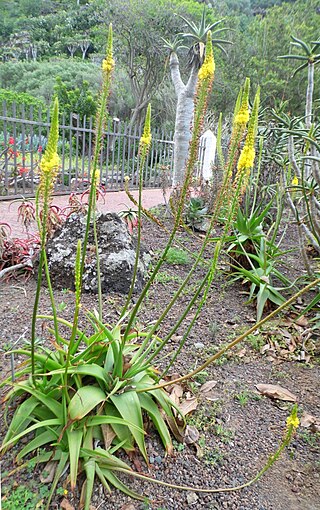
Bulbine alooides ("Rooistorm") is a species of geophytic plant in the genus Bulbine. It is endemic to South Africa, where it grows in the Cape Provinces, KwaZulu-Natal, and Northern Provinces. It is widespread in rocky areas in the southern Cape Region.

Protea convexa, also known as large-leaf sugarbush, is a rare flowering shrub in the genus Protea of the family Proteaceae, which is endemic to the southwestern Cape Region of South Africa.

Dianthus basuticus, called the Drakensberg carnation, Lesotho carnation, Lesotho pink, hlokoa‑la‑tsela in the Sesotho language and Lesothose wilde angelier in Afrikaans, is a species of Dianthus native to South Africa and Lesotho.

Colpias is a monotypic genus of flowering plant in the family Scrophulariaceae. It has only one currently accepted species, Colpias mollis, native to South Africa. It secretes oils to attract specialised oil-collecting bees from the genus Rediviva. It is also known by the name klipblom, meaning stone plant in Afrikaans.

Nemesia denticulata, the toothed aloha, is a species of flowering plant in the genus Nemesia of the figwort family Scrophulariaceae. It is native to the Eastern Cape and KwaZulu-Natal provinces of South Africa. A mat‑forming perennial useful for borders, it has gained the Royal Horticultural Society's Award of Garden Merit.

Arctotis hirsuta is a species of flowering plant that is endemic to South Africa. It occurs in the provinces of the Northern Cape and Western Cape. Most typically found on sandy slopes and flats along the coast in the region between Elandsbaai to the Agulhas Plain. During the spring flower season it can flower in large numbers.
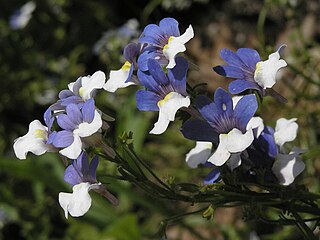
Nemesia strumosa, Cape jewels or pouch nemesia, is a species of flowering plant in the family Scrophulariaceae, native to the southwestern Cape Provinces of South Africa. Suited for garden applications such as beds, borders, rock gardens and containers, its cultivars come in a wide variety of flower colors, including bicolored. When grown as a cool‑weather annual it can be planted in USDA zones 2 through 10.
Dianthus crenatus is a species of flowering plant in the family Caryophyllaceae, indigenous to the Western Cape (Swellendam), Eastern Cape and KwaZulu-Natal Provinces of South Africa.
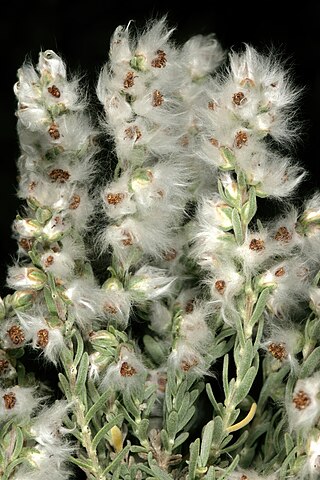
Eriocephalus racemosus is a species of flowering plant in the genus Eriocephalus. It is endemic to the Cape Provinces of South Africa. It is also called the kapokbos.
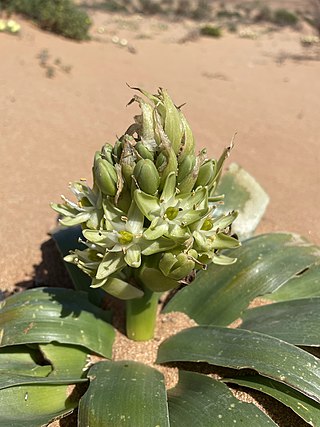
Ornithogalum xanthochlorum is a species of flowering plant in the genus Ornithogalum. It is endemic to the Cape Provinces of South Africa. It also known as the Namaqua chink or slangkop.
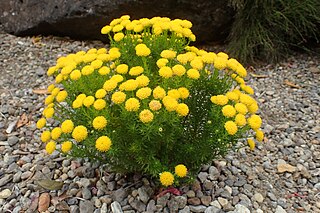
Chrysocoma cernua is a species of flowering plant from the family Asteraceae. It is known by many common names including: shrub goldilocks, golden heads, golden bitter bush, golden cowcud or golden hair.
Diosma haelkraalensis, or Hagelkraal's diosma, is a rare species of plant endemic to the southwestern Cape Provinces of South Africa.

Adromischus alstonii is a species of succulent plant from the family Crassulaceae. The species name is the namesake of Edward Garwood Alston, who was a plant enthusiast from Cape Province, South Africa. A. alstonii is endemic to the Succulent Karoo in the Northern Cape, South Africa.
Nemesia glaucescens is a species of plant endemic to South Africa. It belongs to the figwort family.
Nemesia grandiflora is a species of plant from South Africa.

Nemesia linearis, also known as the witleeubekkie in Afrikaans, is a species of plant from southern Africa. It is found in South Africa and Namibia.

Heliophila pusilla, the dainty sunspurge, is a species of plant in family Brassicaceae. It is endemic to the Cape Provinces of South Africa.






















